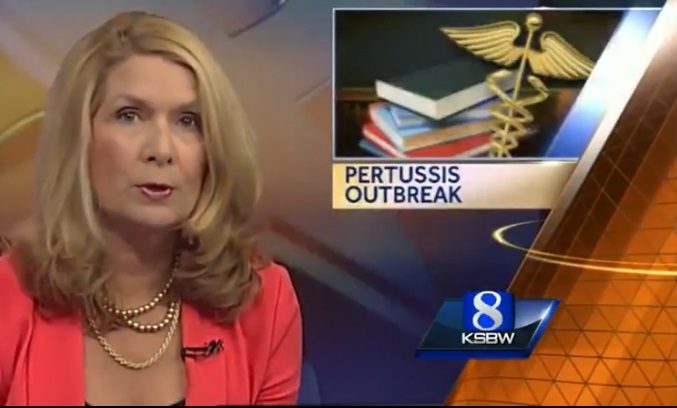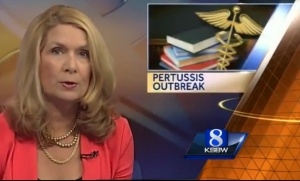 [1]
[1]KSBW in Salinas California reported in March 2015 that a whooping cough outbreak had occurred among fully vaccinated students. Video image from KSBW.com [1].
Health Impact News Editor Comments
News continues to spread regarding the fact that the current pertussis vaccine is ineffective. Health Impact News first reported on this in 2013 after several studies, including studies the FDA [2] and CDC participated in [3], confirmed that the vaccine was no longer effective.
Earlier this year a school in Salinas California reported [1] a whooping cough outbreak among students who were fully vaccinated.
And yet, the U.S. mainstream media keeps blaming unvaccinated children for these whooping cough epidemics, and keeps on encouraging everyone to get the failed vaccine.
ABC in Australia, however, is publishing the truth after a new study was published this month where researchers claimed the failed pertussis vaccine is to blame for recent whooping cough outbreaks, and not unvaccinated children.
Whooping cough increase related to current vaccine
by Dani Cooper [4]
ABC – Australia [4]
Excerpts:
The findings highlight the need to do similar research in Australia where whooping cough cases have spiralled upward in the past decade, co-author Associate Professor Manoj Gambhir, from the University of Monash, says.
In 2012 the US saw the highest number of pertussis (whooping cough) cases since 1955.
At the same time there has been a shift in the age group reporting the largest number of cases from adolescents to 7 to 11 year olds.
In the paper, published today in PLOS Computational Biology [5], Gambhir and colleagues use mathematical modelling of 60 years of pertussis disease data to determine what best explains this increase.
Gambhir says in 1991 researchers developed a new vaccine to address public concerns that the whooping cough vaccine caused a reaction in some children.
This vaccine, known as acellular pertussis vaccine, used particular components of the bacteria that were believed to generate the immune response, but was essentially artificially created.
Gambhir says the impact of the change in vaccine has taken time to show in the data.
“Now in the past decade we have seen a rise from that low to about 10-20 cases per 100,000,” says Gambhir.
“It’s the kind of numbers we haven’t seen since the mid-1950s so we are right back to the period before vaccines were introduced.”
Gambhir says while there is debate over vaccination in the media, they did not find a drop in the overall level of whooping cough vaccination in the US.
Read the full article here [4].
Learn more about the failed pertussis vaccine [6].
